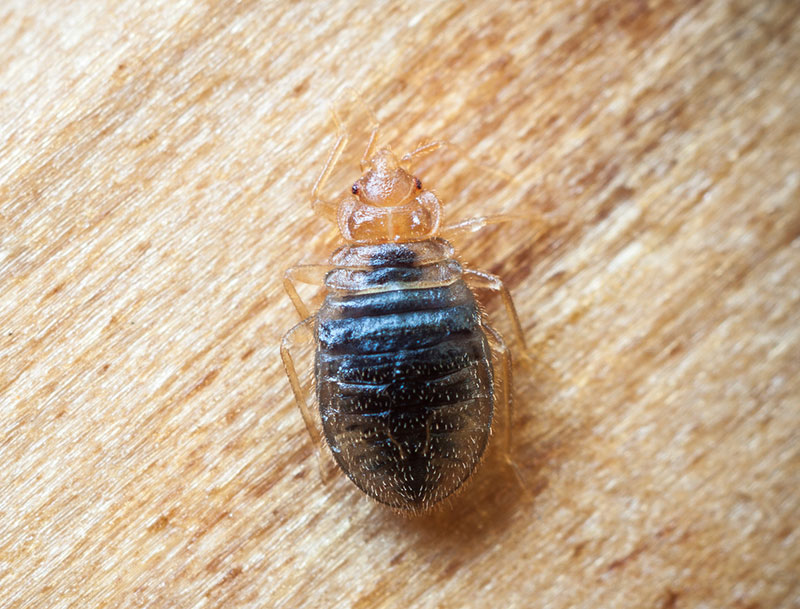

Could You Spot Bed Bugs in a Hotel Room?
Survey finds they're a major worry for U.S. travelers, but many can't identify the annoying pestsWednesday, June 14, 2017

WEDNESDAY, June 14, 2017 (HealthDay News) -- While many travelers think that finding bed bugs in their hotel room would be the stuff of nightmares, very few know what one looks like, a new survey shows.
Just 16 percent were able to spot bed bugs in a lineup of five bug illustrations. Ticks and lice were most often mistaken for bed bugs, while ants or termites were least likely to be confused with the pesky blood suckers.
Study co-author Michael Potter, a professor of entomology at the University of Kentucky, said the findings suggest that plenty of travelers are in the dark about these night-time nuisances.
"Considering all the media attention paid to bed bugs in recent years, the fact that most travelers still have a poor understanding of them is troubling," he said.
Most travelers who took the survey also said they'd seek different lodgings if they saw a single online report of bed bugs, even if it might not be accurate or reflected an infestation in just one room.
For the study, researchers surveyed almost 1,300 leisure travelers and 790 business travelers online about issues regarding hotels. Sixty percent of leisure travelers and 28 percent of the business travelers were women.
Thirty-five percent said they had considered bed bugs but didn't worry about them; 21 percent said they'd never considered bed bugs. As for the worriers, 29 percent said they'd briefly worried about them and 14 percent said they'd often worried about bed bugs.
Fifty-six percent said they wouldn't get a room at a hotel if they read an online report saying it had bed bugs.
"From a hotel industry perspective, it's worrisome that a single online report of bed bugs would cause the majority of travelers to book different accommodations, irrespective of whether the report is accurate," Potter said. "Furthermore, the incident could have involved only one or a few rooms, which the hotel previously eradicated."
Dermatologist Dr. Carrie Kovarik, an associate professor at the University of Pennsylvania, said she has treated patients with bug bites. She wasn't surprised by some of the survey findings, but one of them -- the fact that 60 percent would flee a hotel if they saw signs of bed bugs but only 23 percent would do so if they saw a "foreign material" like blood -- was disturbing.
"I was surprised and somewhat horrified that people would rather switch hotels due to signs of bed bugs but not foreign material such as blood," she said.
Dr. Philip Shenefelt, a professor with the University of South Florida department of dermatology and cutaneous surgery, said it's important to understand that bed bug bites are "annoying but not serious" and don't transmit disease.
"The bites are not specifically distinguishable, but flying insect bites are usually on exposed skin. Flea bites are usually on lower legs, while bed bug bites may be on the trunk as well as elsewhere," he explained.
However, Shenefelt added, "What becomes much more of a problem is if the bugs hitch a ride in opened luggage and return home with you. They are resistant to most pesticides and often have to be destroyed by dry heat. That can be an expensive process requiring special equipment and training."
The bites themselves can be treated with bug bite creams, he said.
As for prevention at hotels, Shenefelt said "it is good practice to check around the bed, lifting the mattress edges off the box springs and looking for tiny bugs and bug skins and stains, before opening suitcases. The adult bed bugs are about the size and shape of apple seeds and have rounded abdomens."
The study, which was funded partly by a protective bedding company called Protect-A-Bed, was published June 13 in the journal American Entomologist.
SOURCES: Michael Potter, Ph.D., professor, entomology, University of Kentucky, Lexington; Carrie Kovarik, M.D., associate professor, dermatology, University of Pennsylvania, Philadelphia; Philip Shenefelt, M.D., professor, department of dermatology and cutaneous surgery, University of South Florida, Tampa; June 13, 2017, American Entomologist
HealthDay
Copyright (c) 2017 HealthDay. All rights reserved.
News stories are written and provided by HealthDay and do not reflect federal policy, the views of MedlinePlus, the National Library of Medicine, the National Institutes of Health, or the U.S. Department of Health and Human Services.
- More Health News on
- Bed Bugs
- Traveler's Health




























.png)











No hay comentarios:
Publicar un comentario